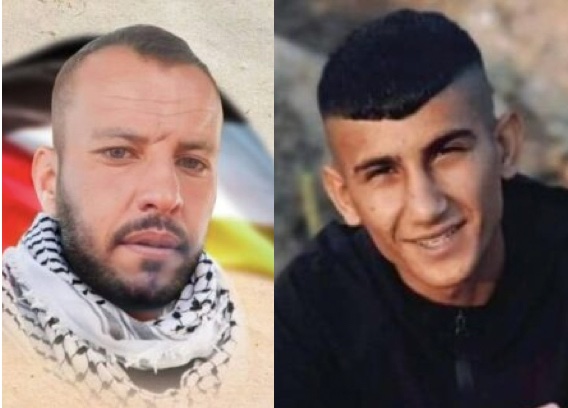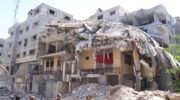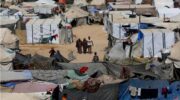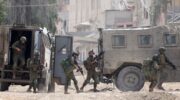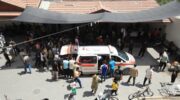Haroun Abu Aram, 27, had been shot in the neck by an Israeli soldier trying to confiscate a family’s generator – Haroun had been a quadriplegic ever since.
Mahmoud Al-Ayedi, 17, was shot in the head during an Israeli military invasion of his refugee camp.
See three articles below:

Israeli Soldiers Kill A Teenage Boy Near Tubas
The Palestinian Health Ministry has confirmed the death of a teenage boy from serious wounds he suffered at dawn when Israeli soldiers shot and seriously injured him in the Al-Far’a refugee camp south of Tubas, in the northeastern West Bank.
The Health Ministry said Mahmoud Majed Al-Ayedi, 17, was seriously injured when the soldiers shot him with a live round in the head and succumbed to his wounds at the Tubas Turkish Governmental Hospital.
His death brings the number of Palestinians killed by Israeli fire this year to 47, including four who the illegal paramilitary colonizers killed; among the slain Palestinians are eleven children and one woman.
Also, a Palestinian detainee, Ahmad Abu Ali, 48, died at an Israeli medical center after he was denied essential medical treatment and was only moved to Soroka medical center when he neared death.
Updated From:
Israeli Soldiers Seriously Injure A Palestinian Near Tubas
Feb 14, 2023, at 08:34
On Tuesday dawn, Israeli soldiers invaded the Al-Far’a refugee camp south of Tubas in the northeastern part of the occupied West Bank, leading to protests, before shooting and seriously injuring one Palestinian and abducting a Palestinian from his home.
The soldiers fired many live rounds, rubber-coated steel bullets, gas bombs, and concussion grenades at Palestinians who protested the invasion.
The Palestinian Red Crescent Society (PRCS) said the soldiers shot Mahmoud Majed Al-Ayedi with a live round in the head before he was rushed to Tubas Turkish Governmental Hospital in a very serious condition.
Also, The head of Tuba’s office of the Palestinian Prisoners’ Society (PPS) said the soldiers also abducted Ahmad Raja Al-Khatib, 45, after storming and ransacking his home, and added that a military dog mauled Ahmad’s son, Raja, in the leg.
Media sources said that Palestinian resistance fighters exchanged fire with the soldiers invading the refugee camp.
On Monday evening, the soldiers abducted a youth, Yousef Ismael Abu Al-Hawa, 15 years of age, in the Al-Aqsa Mosque in occupied Jerusalem and closed all gates of the holy site.
In related news, Israeli sources have confirmed, Monday, the death of a border police officer who was shot by friendly fire after an alleged stabbing attack at a military roadblock on the main entrance of Shu’fat refugee camp, north of occupied Jerusalem in the West Bank. The Palestinian who allegedly attempted the stabbing attack is a 13-year-old child who was detained.
– International Middle East Media Center

Palestinian Dies From Serious Wounds He Suffered Two Years Ago In Hebron
reposted from IMEMC – the International Middle East Media Center, February 14, 2023
Medical sources at Yatta Governmental Hospital, in Yatta town south of the southern West Bank city of Hebron, said a young man died from serious wounds he suffered two years earlier after an Israeli soldier shot him in the neck.
The sources said the young man, Haroun Rasmi Yousef Abu Arram, 27, was shot on January 1, 2021, in the Tiwani area, south of Hebron.
[NOTE: read more about the incident and its consequences in “A Year and a Half After Being Shot by Israeli Soldiers, He Lies Paralyzed in a Cave” – you can read the article by Gideon Levy in its entirety below – and Thanks to the US, the Israeli Military Shot My Cousin, Harun Abu Aram.]
Yatta hospital director, Ziad Abu Zahra, said an Israeli soldier shot Abu Arram with a live round in the neck from point-blank range, causing very serious wounds that resulted in quadriplegia.
Abu Zahra added that the young man also suffered various serious complications, including pneumonia, Peripheral artery disease in his leg before it was amputated, severe pneumonia, and serious pressure sores in the back and pelvis.
Abu Arram was moved to several hospitals and underwent numerous surgeries due to constant complications until he succumbed to his wounds.
After the young man was shot, his father said the army had been trying to force the family to leave their lands.
“They have been pressuring us to leave our lands; Haroun did nothing wrong; he was in his home when the soldiers came and tried to confiscate the electricity generator, which the family depends on,” the father added, “It is not a separate or a one-time incident; this is an ongoing occupation and escalating violations against innocent civilians.”
The father added that at the time of the shooting, his son had recently become engaged, and was planning to get married within a few days.
Alaom, the Israeli army demolished his home two months before shooting him, under the pretext of being built without a permit from the “Civil Administration Office,” run by the illegal Israeli military occupation.

A Year and a Half After Being Shot by Israeli Soldiers, He Lies Paralyzed in a Cave
by Gideon Levy and Alex Levac, reposted from Ha’aretz, June 2, 2022
First, one’s eyes have to get used to the dim lighting in the cave. Then, the picture reveals itself in its full horror: On the floor lies the body of a human being, motionless, his legs raised up on a plastic chair, his head wrapped in a towel, his eyes shut. He lies like that for most of the day, perhaps sleeping, perhaps just lacking any will to open his eyes.
He has been lying like that for months – and will probably remain like that forever. His father wipes the sweat from his face, a tube siphons off phlegm from his throat, a towel is wrapped around his groin, a blanket covers his body. The sight is awful. After the initial shock – because, nothing prepares you for the awfulness – the compassion, and the inevitable frustration, comes a feeling of rage against a state that abandons a victim of its soldiers like this without taking any responsibility for their being so trigger-happy.
The soldier who shot Harun Abu Aram, the young man who lies on the floor of the cave, paralyzed for life, was never brought to justice. Harun’s life came to an end, effectively, on the day he was shot in the neck about a year and a half ago, while the life of the soldier who shot him has continued undisturbed.
He probably doesn’t even remember how he shot the young shepherd, at point-blank range, when Abu Aram tried to prevent the soldiers from confiscating his neighbor’s generator. Without a generator, there is no life in the caves of the South Hebron Hills.
The minimal punishment that should have been imposed on the soldier and his comrades-in-arms, the fearless confiscators of generators, the daring “warriors” of the Israel Defense Forces, was to force them to visit the cave that is part of the shepherd community of Khirbet al-Rakiz, to go inside, stand there, observe their handiwork – and then bow their heads in shame.
The incident took place on January 1, 2021, Harun’s 24th birthday. Harun was born with the help of a midwife from Yatta, in the very cave where he now lies, unable to move. A video taken by one resident documented the incident in which the soldiers tried to take the generator, in an effort to encourage the inhabitants to leave.
Abu Aram and several other young people try to prevent them from taking it. One group pulls one way, another pulls the other way in a dance that no one seems to realize will become a dance of fire that will end with the terrible shot that hit Harun in the neck. The exact moment the shot is fired is not visible in the video, only its sound and then the cries of the women who watched as events unfolded, followed by the image of Harun Abu Aram lying motionless on the ground.
Harun’s father, Rasmi Abu Aram, says that the Civil Administration officers who interrogated him after the incident asked him who shot his son.
Then came the IDF’s lies: The “investigation” that followed led the army to the conclusion that the force faced a “clear and present risk to their lives.” The heart bleeds in the face of this imaginary danger. A clear and present risk to their lives, from whom? From a small group of unarmed shepherds trying to save their generator? After all, videos don’t lie, and there are no images that show any danger lying in wait for the soldiers other than mutual pushing and shoving and a tug-of-war over the generator, with shouting in the background.
None of this posed a risk, not to a single hair on the head of even one soldier. The shooting was accidental, the IDF investigation concluded. Do its soldiers know only to shoot live fire into the neck when their mission is to confiscate a generator? Do they have no other skills and are such mistakes really to go unpunished?
But all of this just amounts to history for the Abu Aram family, whose lives have since become unbearable in a way that cannot be described in words. Immediately after the incident, the Israeli Civil Administration took away the work permit of Rasmi, the father, a 54-year-old laborer who worked paving roads in Israel. That is what the administration does with the families of every IDF victim, just in case they decide to take revenge.
Israel didn’t take any responsibility for the incident and didn’t think to provide any rehabilitative aid or financial compensation, even if it is technically beyond the letter of the law. What’s more, the Civil Administration went so far last year as to confiscate three of the family’s tents, in an effort to drive them away, even after their son became so terribly disabled.
Moreover, it is refusing permission to the family to build a room for the son to live out his life in conditions that are a little more comfortable than those in the cave, and will not allow the paving of an access road to the house at the foot of the hill. And so, Abu Aram lies on the floor of the cave while his parents and sisters take care of him with great dedication, day and night.
Rasmi is wearing a gray shirt bearing the logo of the Electra company, a reminder of the days when he could still work in Israel. Since his son’s injury, he has stopped working. The family has 10 sheep and a small vegetable garden on the slopes of the hill; from this they are supposed to make a living and take care of Harun. His medication and diapers alone cost them between 5,000 and 7,000 shekels (about $1,500 to $2,000) a month.
It isn’t clear where they get this kind of money from. There is a group of decent Israelis who help them and in the past some NGOs helped, but the party that really should have paid for the “mistake” coldheartedly refuses to do so. Attorney Hussein Abu Hussein is currently pursuing a legal effort against the IDF to try and force it to pay some compensation to Abu Aram.
The family home here, made of stone, was demolished by the Civil Administration in 2020. After all, this is Firing Zone 918. Such destruction, of course, only happens when Palestinian shepherds are involved – never to the residents of the surrounding Israeli settlements and outposts, which include the neighboring outpost of Ma’aleh Avigail.
Rasmi and his wife Farissa, 42, have five daughters and two sons. About a year before Harun was shot, he had been arrested for residing illegally in Be’er Sheva, where he worked for a living. For that, he was sentenced to four months’ imprisonment. A short time before he was shot, he became engaged to a girl from one of the neighboring villages in the Masafer Yatta region. The engagement was called off because of his situation. Now Harun will probably never marry.
On that Black Friday, army forces arrived turned up to demolish structures belonging to neighbors of the Abu Aram family. Clashes broke out on a dirt road nearby, the soldiers fired in the air, and Harun saw one of the soldiers shoving and hitting his father. He rushed to the scene of the clash – which can be seen from the visitors’ tent, where we sat this week – to defend his father.
Later, the soldiers tried to confiscate the generator from the neighbors, and then the shooting happened, right in front of Rasmi. He quickly carried his wounded son, whom he thought was dead, to a neighbor’s car. But then the soldiers shot at its tires, and the vehicle could not be driven. Another vehicle arrived, from the village of Al-Tuwani, but the soldiers blocked the exit road.
Rasmi recalls now that a soldier pointed his rifle at the car in which his wounded son was being evacuated; it was forced to go back. Residents then managed to take Harun to the nearby village of Karmil, where he received first aid – the IDF didn’t think to administer any after the shooting – and then a Palestinian ambulance arrived and took him to the hospital in Yatta.
After a short while, physicians there informed the family that they didn’t have the means to provide proper treatment to Harun, and he was taken to Al-Ahli Hospital in Hebron. He was hospitalized in the intensive care unit there for over four-and-a-half months.
The doctors told the Abu Arams that a bullet had pierced their son’s neck and severed his spinal cord. “It’s a head without a body,” one of them said. Rasmi decided he wanted to transfer Harun to a rehabilitation unit in Israel. The Palestinian Authority refused to finance the hospitalization claiming that there was no room in Israeli rehabilitation institutions.
However, with the help of the Physicians for Human Rights NGO, Rasmi contacted the Reuth Rehabilitation Hospital in Tel Aviv, which agreed to take Harun. He spent five months there at a cost of close to 100,000 shekels a month, a sum that his family had to raise; PHR helped out.
Harun’s parents would rotate being on duty, each spending three weeks at Harun’s side. But then, without warning, his condition deteriorated, and the doctors were forced to transfer him to Ichilov Hospital, where he remained for another four weeks.
“Good people,” as Rasmi calls them, helped him to finance the hospitalization there. At that point Rasmi wanted to send his son back to Reuth but there was no room for him, so he took Harun back to the cave in Khirbet al-Rakiz that is their home – most likely for the rest of his life.
Since then, the family’s life has revolved around the young man’s care. He suffers from pressure sores and other medical complications resulting from his situation and the conditions in which he lives. He now breathes independently but needs a tube to drain his throat.
The equipment for this is powered electrically, and until recently, they were dependent on a generator in a place where Israel does not allow their Palestinians to connect to the electricity grid. And generators are often confiscated. Recently, the Comet-ME NGO had solar panels installed near their cave.
Harun Abu Aram is no longer capable of doing anything independently. He has to be fed and washed, and have every other need taken care of. When something itches, he needs someone to scratch him, says his mother. It is only at night when everyone is asleep that he dares opens his eyes; otherwise he is too depressed to look around. At times, he cries bitterly.
Three times a week Rasmi puts him in a wheelchair that looks more like a stretcher and carries him to a rundown car, in order to take him for a checkup at the hospital in Yatta; every month, Harun’s drainage machine also needs to undergo maintenance. Rasmi would like to buy a car that is more suitable to for carrying his son’s wheelchair, but he doesn’t have the money. Harun can’t sit for a moment without his head being propped up as his neck muscles have completely atrophied.
What do the doctors say? Rasmi replies: “Halas, halas [enough]! He’s finished. It’s the end, they say.” There is no chance that his situation will improve and there is no more that can be done from a medical perspective. The family has given up on rehabilitation, which can be achieved by various innovative treatments and special equipment, but is extremely costly.
A few weeks ago, Harun Abu Aram’s uncle was released from prison in Israel, and Rasmi took him to a family celebration marking the release. When they returned home to the cave, Harun burst out crying and was inconsolable. “You all ate and I can’t even feed myself.”
Rasmi says he is willing to take him wherever he wants or needs to go. “No police or army will stop me, not even at midnight. If he is in the mood, I take him out.” Sometimes he takes Harun with him when he is grazing the family’s flock, just so that he can see something else. But Harun is calmest when he is at home. Here he feels protected, his father says.
There is no rage in the family about what happened, at least not in an open way. Just a vague hope that somehow, something will improve. “I wish he could just move one hand, just one hand,” Rasmi says, adding that when Harun sees soldiers, he tries to say, “Look what happened to me. I lost everything, my life, my fiancée, my body, and my work.”
“Nobody can take care of him like his mother and sisters,” Rasmi adds, noting that until recently, a nurse came to treat Harun’s pressure sores. But now his mother can do that by herself; in any case, they have no money to pay a nurse.
An IDF spokesperson was asked this week if there are any new developments in the investigation of the incident. The following response was given: “A Military Police Criminal Investigation Unit inquiry was launched following the incident. The investigation has been completed and its findings are under consideration by the military prosecution.”
We went into the cave. Harun’s eyes were shut. A towel was wrapped around his head, he was surrounded by his infant nephews. Suddenly, he opened his eyes and asked us to leave. Immediately.
For a complete list of Palestinians and Israelis killed since 2000, please visitIsrael-Palestine Timeline
NOTE: The entire West Bank has been under Israeli occupation since 1967; all its official entrances and exits are controlled by Israeli soldiers, making its Palestinian inhabitants virtual prisoners. Many are families that were ethnically cleansed from Israel during Israel’s founding war (see this and this and this). Israeli forces often invade them; one example is here.
Israel was established in 1947 through a war of ethnic cleansing of the indigenous population, both Muslims and Christians, and it continues to steal other people’s land for illegal colonies known as ‘settlements.’ While Palestinians most often use nonviolent resistance, a small number use armed resistance against the invaders.
Thanks to the pro-Israel lobby in the US, Congress disburses over $20 million per day of Americans’ tax money directly to and/or on behalf of Israel.
OTHER PALESTINIAN DEATHS THIS MONTH AT THE HANDS OF ISRAEL:
- Israeli Soldiers Kill Another Young Man, Injure Seven
- Israelis kill a father of three and a 14-year-old
- 5 more deaths in Israel-Palestine, 3 Palestinians, 2 Israelis
- Israeli Army Kills A Palestinian Youth In Nablus – Shot in the Face
- Israeli Soldiers Kill Five Palestinians In Jericho
- Israeli forces kill Palestinian father of newborn with a bullet to the chest
OTHER RECENT ISRAEL-PALESTINE NEWS:
- Israel committed 3,532 human rights violations against Palestinians in January
- ‘Powerful Lobbyist Behind Kevin McCarthy’ is Israel Advocate
- Israel’s little-known concentration and labor camps (1948-1955)
- Israeli government: stories you may have missed
VIDEOS:

